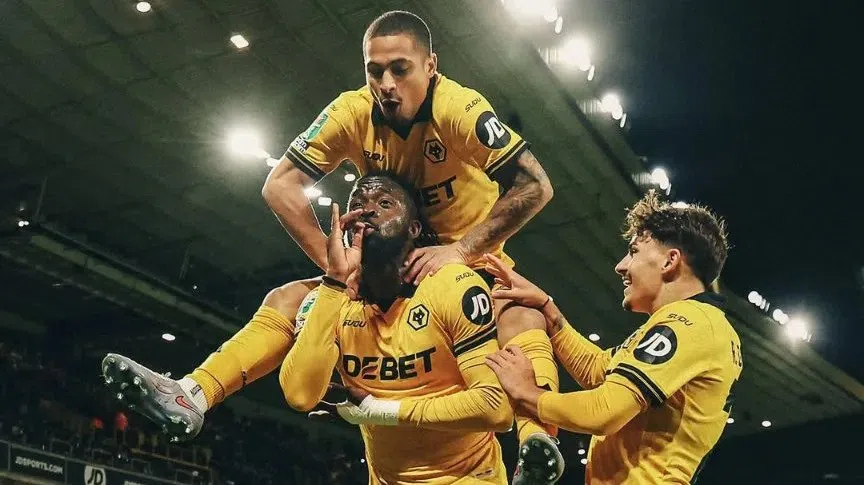The Wolves vs Chelsea EFL Cup match had everything that gives this competition its heartbeat, a blistering start from the visitors, a furious home fightback, a red card that set nerves jangling, and finally a wonder strike that decided a 4-3 classic at Molineux. Chelsea sprinted into a three goal lead by halftime, Wolves roared back after the break, and Jamie Gittens delivered the decisive moment as Enzo Maresca’s side survived a late barrage to advance.
From the opening whistle, Chelsea hunted in packs and punished mistakes. In the fifth minute a loose touch in Wolves’ half invited pressure, Jamie Gittens stole in and teed up Andrey Santos, who curled a first time finish into the bottom corner for his first Chelsea goal.
Gittens was again at the heart of the second, bursting down the left and gliding past Matt Doherty before fizzing a low cross that Tyrique George turned home from close range in the 15th minute. It was rapid, incisive football that left the home crowd stunned.
The third arrived just before the interval and it followed the same pressing blueprint. Andrey Santos pinched the ball from Fernando López, it broke kindly to Estêvão, and the forward showed composure with a deft dink over José Sá in the 41st minute to make it 3-0. The scoreline flatly underlined Wolves’ defensive frailties as much as it rewarded Chelsea’s aggression.
Wolves emerged from halftime transformed, their intent clear and their passes sharper. Three minutes after the restart Hwang Hee chan threaded a clever ball into the path of Tolu Arokodare, who clipped a low finish past the keeper in the 48th minute. That single strike changed the temperature in the stadium and ignited belief.
Pressure continued to build and Molineux grew louder with each cross and set piece. The breakthrough for a second arrived from a long throw in the 73rd minute, a pinball of flicks through Marshall Munetsi, then Ladislav Krejčí and Emmanuel Agbadou, before David Wolfe crashed in at the back post. It was his first goal for Wolves and it set the stage for a breathless finale.
The tension ratcheted up again when Chelsea were reduced to ten men in the 86th minute. Substitute Liam Delap, on for Estêvão, collected two bookings in seven minutes, first for a push on Yerson Mosquera and then for a barge on Emmanuel Agbadou. With the numerical advantage and momentum, Wolves pushed almost everyone forward.
Yet Chelsea found their release in spectacular style. As Wolves struggled to clear a scruffy phase inside their box in the 89th minute, the ball sat up for Jamie Gittens, who drilled a thunderous effort that cannoned in off the post. The strike restored a two goal cushion and looked like the killing blow.
Wolves refused to fold, and there was more drama in stoppage time. A scramble in front of goal saw David Wolfe react quickest again, sweeping in a finish at 90+1 minutes to pull it back to 4-3. The hosts poured forward for one final charge, but Chelsea held the line and saw out the remaining seconds.
Maresca fumes at avoidable red card
After the final whistle, Enzo Maresca’s delight at progression was tempered by anger over the sending off. Asked if the team’s recent spate of dismissals was becoming an embarrassment, he did not sugarcoat it. He highlighted that Chelsea have received six red cards in their last nine matches and insisted incidents like this must stop.
Yes, it’s embarrassing when it’s a red card like today. Because it’s two yellow cards in five minutes. Both, I think, we can avoid that. So it’s not good.
After the yellow card, I told him four or five times to keep calm. But Liam is a player who, when he’s inside the pitch, probably will be playing the game for himself, and he struggles to realise and to listen around him.
Very stupid red card that was completely unnecessary. Absolutely deserved. It was a stupid foul. We can avoid that. I completely support the red card.
Maresca contrasted Delap’s dismissal with other recent incidents he felt were more understandable, citing challenging circumstances in matches against Brighton and Manchester United, while classing the Nottingham Forest episode and this one as avoidable. He also noted that this was the first red card of Delap’s professional career, which made the lapse in judgement all the more frustrating.
Vitor Pereira lauds Arokodare progress
On the other side of the tunnel, Wolves manager Vitor Pereira chose to focus on bright sparks. He praised the impact of Nigerian striker Tolu Arokodare, who not only opened the door to a comeback but showcased the traits Wolves hope to harness consistently. It was Arokodare’s second goal for the club in this season’s Carabao Cup and, to Pereira, a sign that the forward is now in step with the demands of the team.
Pereira explained that the striker’s fitness and understanding have improved with more training and stronger connections with teammates. The manager’s message was simple, Arokodare is ready to help and ready to compete for more minutes as the fixtures keep coming.
Wolves remain without a Premier League win this season, which sharpens the significance of any spark they can find. The next stop is Craven Cottage to face Fulham on Saturday, and Pereira will hope the resilience seen in this cup tie can translate into much needed league points.
What the result means for both teams
For Chelsea, a place in the next round brings validation for their pressing approach and a timely reminder of their attacking potential. Performers like Gittens, Santos and Estêvão were decisive in the moments that mattered, and the team showed character to withstand a dangerous late onslaught with ten men. Yet the disciplinary cloud lingers, and Maresca’s pointed words underline a theme that could derail momentum if not corrected quickly.
For Wolves, the opening half exposed familiar issues at the back, but the reaction after halftime will hearten supporters. Arokodare’s finish, Wolfe’s instinct inside the box, and an improvement in tempo provided the backbone of a response that so nearly forced extra time. If Wolves can bottle the intensity of that second half, and pair it with greater defensive stability, the search for that first league victory should not be far off.
Tactical trends and turning points
Chelsea’s first half was built on coordinated, compact pressing in advanced areas, which disrupted Wolves’ build up and created turnovers in dangerous zones. The opening goal stemmed from exactly this, as Gittens pounced high and Santos applied the touch of class. The visitors also attacked with width and speed, a blend that allowed runners like Tyrique George to appear in the six yard box at precisely the right time.
Wolves tweaked their rhythm after the break, moving the ball quicker into the channels and attacking space behind Chelsea’s full backs. Hwang Hee chan’s pass for Arokodare was a model of timing and weight, and the use of long throws and aerial routes, as seen for Wolfe’s first, exploited uncertainty in the penalty area. Once the contest tilted, Chelsea could not wrestle back control until the moment of Gittens’ strike, which arrived as much needed respite.
The red card added chaos and tested Chelsea’s game management, but the decisive detail was execution in key moments. Where Wolves’ second half was about wave after wave of pressure, Chelsea’s answer came from a single strike of pure quality by Gittens, a finish that felt as emphatic as it sounded off the woodwork.
Key moments at a glance
- Santos curls in a classy opener after Gittens wins the ball high,
- Arokodare clips in a cool finish to spark the Wolves revival,
- Gittens rifles off the post late to settle a gripping cup tie.
The human stories behind the scoreline
There was personal significance wrapped inside the chaos. Santos celebrated a first goal for Chelsea with the composure of a seasoned campaigner, a moment that can anchor confidence for a young midfielder. Gittens, the live wire who created one and scored another, turned aggression off the ball into artistry on it, the sort of balance coaches crave and fans remember.
For Wolves, Arokodare’s contribution felt like a statement of intent and a promise of more to come. His manager sees a fitter, smarter, more connected forward, one who can be a focal point when the team needs a route back into a game. David Wolfe, too, will hold tight to the feeling of that first goal for the club, and then the second in stoppage time, proof that persistence and positioning can spark belief even when the scoreboard looks bleak.
And then there is Delap, back from injury and thrown into a tight contest, only to be told in the bluntest terms by his manager that the decision making must sharpen. Cup ties can be classrooms as much as showcases, and this one taught a hard lesson about composure under fire.
When the noise settled, Chelsea walked away with progression and a highlight reel strike, while Wolves carried the scent of a comeback that almost was. The margins were thin, the emotions raw, and the narrative rich, exactly what this competition promises on nights like these. As both clubs pivot back to the league, the echoes of Molineux will linger, urging one side to tidy up their discipline and encouraging the other to believe that a corner can still be turned.






